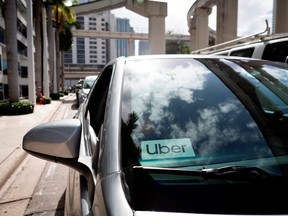Mandating higher wages will only make things worse

Article content
As Canada’s economy and GDP per capita stagnate into a productivity crisis, citizens look to the government and ask if this will eventually get better. A small but revealing legislative change in British Columbia has hinted at the answer: no.
Last week, B.C.’s NDP government introduced regulations to “provide fairness, minimum-wage measures and basic protections for app-based ride-hailing and delivery workers in British Columbia.” Starting in September, the rules will create a gig worker minimum salary of $20.88 — 120 per cent of the current minimum wage in B.C. — as well as price-per-kilometre reimbursement minimums and certain other worker protections.
Advertisement 2
Article content
Depending on your philosophical leaning, these regulations may not appear so bad. Who doesn’t want gig workers to have decent working conditions and pay? Certainly not me. However, the legislation is indicative of the government’s instincts when it comes to the economy: regulate and mandate. This instinct is apparent at both the provincial and federal levels, and it is hurting Canadians.
As Canada’s economy falls behind, we ultimately have a decision to make: are we a free-market economy, or are we going to allow government bureaucrats and politicians to steer our economy according to their ideological whims? The costs of the latter are already clear, adding fuel to the fire of our massive productivity crisis.
One of the most blatant examples of money thrown around in irresponsible ways is the Trudeau government’s commitment to subsidizing the electric car industry, which has included more than $40 billion in subsidies for three battery plants. This industry may prove to be successful in the future, but estimated returns on the public contributions to these projects are at best vague (the Parliamentary Budget Officer predicts these subsidies will break even in 20 years) and only underscore the fact that politicians are the last people who should be trusted to make business decisions.
Article content
Advertisement 3
Article content
Meanwhile, overregulation and outright hostility to highly profitable resource industries such as oil and gas have cost us billions of dollars in missed economic opportunities.
This philosophy of overregulation and top-down mandates seeps into the entire economy. Job growth is now driven not by private business but by the public sector. The unfortunate results of an incessant government tendency to control the economy are predictable and always the same: lower salaries for Canadians coupled with the added insult of higher prices.
As another jurisdiction that believes regulation is the path to worker prosperity, California provides a cautionary tale for provinces like B.C. In April, California introduced a new minimum wage law that requires fast food workers to be paid $20 per hour. What has happened since? Well, restaurants and businesses have responded as one would expect they would: by raising prices and announcing hiring freezes.
Though beset by many problems in recent years, one problem California does not have is a lack of economic productivity, thanks to its position as a global leader in technology. Notably, the state’s tech dominance was made possible by a regulation-light environment.
Advertisement 4
Article content
While some may like to think B.C. is just like California, it isn’t — and neither is Canada. For close to 10 years now, faced with economic policy decisions, the default Canadian move has been to regulate and control. When we are not busy regulating, we are busy taxing, the latest example being Finance Minister Chrystia Freeland’s plan to increase the capital gains inclusion rate.
Our economies need to grow. In a speech at last week’s G7 summit in Italy, BlackRock CEO Larry Fink noted that there is no way for advanced economies to tax or cut their way out of their current economic situation. Innovation and productive investment are needed instead. The government’s role here is not to meddle in the minutia of employee salaries or business decisions, but to create an attractive investment environment and get out of the way.
In Canada, it’s obvious that the economy is suffering under the weight of government regulations. Mandating higher wages or picking winners and losers in government-preferred industries will do nothing to reverse our declining standard of living. Politicians who overregulate and then tell companies like Uber to “suck it up,” — as Premier David Eby did at a recent news conference — will only leave a legacy of unemployment and economic stagnation when they are inevitably booted out of office.
National Post
Recommended from Editorial
Article content
Adam Pankratz: B.C.'s gig worker minimum wage is an economy-killer we don't need - National Post
Read More


Comments